Related Research Articles
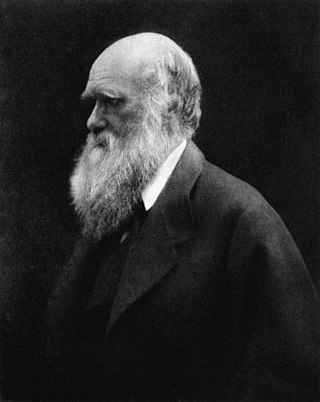
Darwinism is a theory of biological evolution developed by the English naturalist Charles Darwin (1809–1882) and others, stating that all species of organisms arise and develop through the natural selection of small, inherited variations that increase the individual's ability to compete, survive, and reproduce. Also called Darwinian theory, it originally included the broad concepts of transmutation of species or of evolution which gained general scientific acceptance after Darwin published On the Origin of Species in 1859, including concepts which predated Darwin's theories. English biologist Thomas Henry Huxley coined the term Darwinism in April 1860.
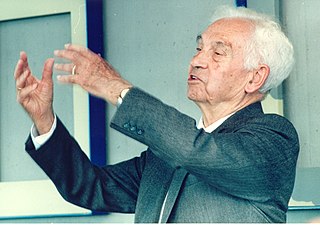
Ernst Walter Mayr was one of the 20th century's leading evolutionary biologists. He was also a renowned taxonomist, tropical explorer, ornithologist, philosopher of biology, and historian of science. His work contributed to the conceptual revolution that led to the modern evolutionary synthesis of Mendelian genetics, systematics, and Darwinian evolution, and to the development of the biological species concept.

Speciation is the evolutionary process by which populations evolve to become distinct species. The biologist Orator F. Cook coined the term in 1906 for cladogenesis, the splitting of lineages, as opposed to anagenesis, phyletic evolution within lineages. Charles Darwin was the first to describe the role of natural selection in speciation in his 1859 book On the Origin of Species. He also identified sexual selection as a likely mechanism, but found it problematic.
The Linnean Society of London is a learned society dedicated to the study and dissemination of information concerning natural history, evolution, and taxonomy. It possesses several important biological specimen, manuscript and literature collections, and publishes academic journals and books on plant and animal biology. The society also awards a number of prestigious medals and prizes.
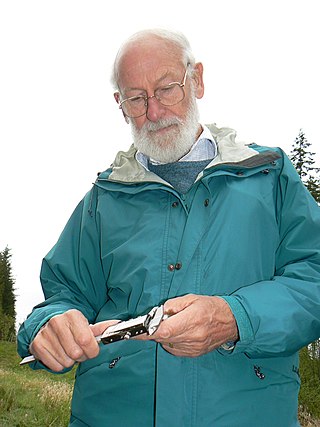
Peter Raymond Grant and Barbara Rosemary Grant are a British married couple who are evolutionary biologists at Princeton University. Each currently holds the position of emeritus professor. They are known for their work with Darwin's finches on Daphne Major, one of the Galápagos Islands. Since 1973, the Grants have spent six months of every year capturing, tagging, and taking blood samples from finches on the island. They have worked to show that natural selection can be seen within a single lifetime, or even within a couple of years. Charles Darwin originally thought that natural selection was a long, drawn out process but the Grants have shown that these changes in populations can happen very quickly.
Bryan Campbell Clarke was a British Professor of genetics, latterly emeritus at the University of Nottingham. Clarke is particularly noted for his work on apostatic selection and other forms of frequency-dependent selection, and work on polymorphism in snails, much of it done during the 1960s. Later, he studied molecular evolution. He made the case for natural selection as an important factor in the maintenance of molecular variation, and in driving evolutionary changes in molecules through time. In doing so, he questioned the over-riding importance of random genetic drift advocated by King, Jukes, and Kimura. With Professor James J Murray Jnr, he carried out an extensive series of studies on speciation in land snails of the genus Partula inhabiting the volcanic islands of the Eastern Pacific. These studies helped illuminate the genetic changes that take place during the origin of species.
Professor Geoffrey Alan Parker FRS is an emeritus professor of biology at the University of Liverpool and the 2008 recipient of the Darwin Medal. Parker has been called “the professional’s professional”.

George Ledyard Stebbins Jr. was an American botanist and geneticist who is widely regarded as one of the leading evolutionary biologists of the 20th century. Stebbins received his Ph.D. in botany from Harvard University in 1931. He went on to the University of California, Berkeley, where his work with E. B. Babcock on the genetic evolution of plant species, and his association with a group of evolutionary biologists known as the Bay Area Biosystematists, led him to develop a comprehensive synthesis of plant evolution incorporating genetics.
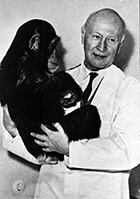
Bernhard Rensch was a German evolutionary biologist and ornithologist who did field work in Indonesia and India. Starting his scientific career with pro-Lamarckian views, he shifted to selectionism and became one of the architects of the modern synthesis in evolutionary biology, which he popularised in Germany. Besides his work on how environmental factors influenced the evolution of geographically isolated populations and on evolution above the species level, which contributed to the modern synthesis, he also worked extensively in the area of animal behavior (ethology) and on philosophical aspects of biological science. His education and scientific work were interrupted by service in the German military during both World War I and World War II.
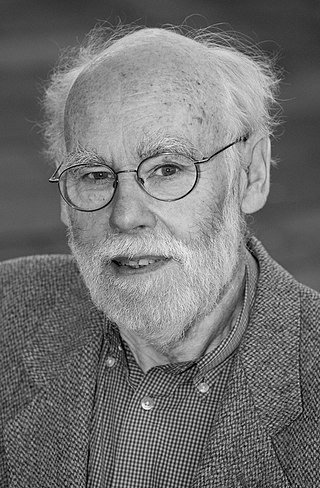
Brian Charlesworth is a British evolutionary biologist at the University of Edinburgh, and editor of Biology Letters. Since 1997, he has been Royal Society Research Professor at the Institute of Evolutionary Biology (IEB) in Edinburgh. He has been married since 1967 to the British evolutionary biologist Deborah Charlesworth.
Nicholas Hamilton Barton is a British evolutionary biologist.

Sir Edward Bagnall Poulton, FRS HFRSE FLS was a British evolutionary biologist, a lifelong advocate of natural selection through a period in which many scientists such as Reginald Punnett doubted its importance. He invented the term sympatric for evolution of species in the same place, and in his book The Colours of Animals (1890) was the first to recognise frequency-dependent selection. Poulton is also remembered for his pioneering work on animal coloration. He is credited with inventing the term aposematism for warning coloration, as well as for his experiments on 'protective coloration' (camouflage). Poulton became Hope Professor of Zoology at the University of Oxford in 1893.
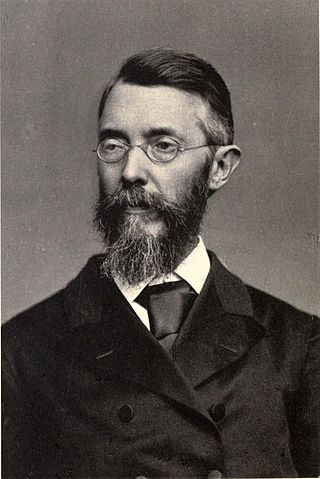
John Thomas Gulick was an American missionary and naturalist from Hawaii. He was one of the pioneers of modern evolutionary thinking based on his studies of Hawaiian snails of the genus Achatinella. He was among the first to describe the formation of species through geographic separation of breeding populations. He developed early ideas on the founder effect and what is now known as the Baldwin effect. He coined the term "divergent evolution".
Heliconius comprises a colorful and widespread genus of brush-footed butterflies commonly known as the longwings or heliconians. This genus is distributed throughout the tropical and subtropical regions of the New World, from South America as far north as the southern United States. The larvae of these butterflies eat passion flower vines (Passifloraceae). Adults exhibit bright wing color patterns which signal their distastefulness to potential predators.
The species problem is the set of questions that arises when biologists attempt to define what a species is. Such a definition is called a species concept; there are at least 26 recognized species concepts. A species concept that works well for sexually reproducing organisms such as birds may be useless for species that reproduce asexually, such as bacteria. The scientific study of the species problem has been called microtaxonomy.
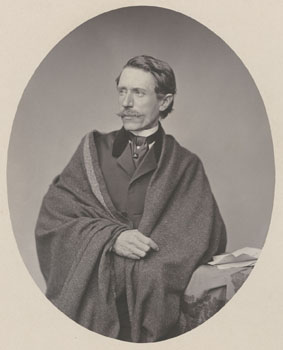
Moritz Wagner was a German explorer, collector, geographer and natural historian. Wagner devoted three years (1836–1839) to the exploration of Algiers: it was here that he made important observations in natural history, which he later supplemented and developed: that geographical isolation could play a key role in speciation.

The Darwin–Wallace Medal is a medal awarded by the Linnean Society of London for "major advances in evolutionary biology". Historically, the medals have been awarded every 50 years, beginning in 1908. That year marked 50 years after the joint presentation by Charles Darwin and Alfred Russel Wallace of two scientific papers—On the Tendency of Species to form Varieties; and on the Perpetuation of Varieties and Species by Natural Means of Selection—to the Linnean Society of London on 1 July 1858. Fittingly, Wallace was one of the first recipients of the medal, in his case it was, exceptionally, in gold, rather than the silver version presented in the six other initial awards. However, in 2008 the Linnean Society announced that due to the continuing importance of evolutionary research, the medal will be awarded on an annual basis beginning in 2010.

Mohamed Noor is the Interim Vice Provost for Academic Affairs and a Professor in the Biology Department at Duke University. His specialties include evolution, genetics and genomics.
Sarah Perin "Sally" Otto is a theoretical biologist, Canada Research Chair in Theoretical and Experimental Evolution, and is currently a Killam Professor at the University of British Columbia. From 2008-2016, she was the director of the Biodiversity Research Centre at the University of British Columbia. Otto was named a 2011 MacArthur Fellow. In 2015 the American Society of Naturalists gave her the Sewall Wright Award for fundamental contributions to the unification of biology. In 2021, she was awarded the Darwin-Wallace Medal for contributing major advances to the mathematical theory of evolution.

The scientific study of speciation — how species evolve to become new species — began around the time of Charles Darwin in the middle of the 19th century. Many naturalists at the time recognized the relationship between biogeography and the evolution of species. The 20th century saw the growth of the field of speciation, with major contributors such as Ernst Mayr researching and documenting species' geographic patterns and relationships. The field grew in prominence with the modern evolutionary synthesis in the early part of that century. Since then, research on speciation has expanded immensely.
References
- ↑ Badcock, C. F.; La Corrie, J. R. Winchester College: A Register for the Years 1930 To 1975. Winchester College, 1992. Page 556
- ↑ Academic Staff at UCL Department of Genetics, Evolution and Environment
- ↑ "James Mallet". Harvard University. Archived from the original on 24 September 2015. Retrieved 21 June 2015.
- ↑ Mallet J (September 2008). "Hybridization, ecological races and the nature of species: empirical evidence for the ease of speciation". Philosophical Transactions of the Royal Society of London. Series B, Biological Sciences. 363 (1506): 2971–86. doi:10.1098/rstb.2008.0081. PMC 2607318 . PMID 18579473.
- ↑ "Linnean Society to award Darwin-Wallace medal on Darwin's 200th birthday". The Alfred Russel Wallace Website. Archived from the original on 4 March 2016. Retrieved 26 June 2015.
- ↑ "The Darwin-Wallace Medal". The Linnean Society of London. Retrieved 28 February 2018.